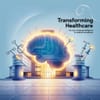Artificial intelligence (AI) is making waves in the healthcare sector, ushering in a new era of innovation that has the potential to revolutionize patient care and medical research. From diagnostics to treatment planning, AI is becoming an integral part of modern medicine, enhancing both efficiency and accuracy.
One of the most significant advancements in AI is its ability to analyze vast amounts of medical data quickly. By processing information from electronic health records, medical imaging, and even genetic data, AI algorithms can identify patterns that may not be immediately apparent to human clinicians. This capability is particularly valuable in diagnostics, where early detection of diseases can dramatically improve patient outcomes.
For example, AI-powered tools are being used to analyze radiology images, enabling faster and more precise identification of conditions like tumors or fractures. By assisting radiologists in their assessments, AI not only speeds up the diagnostic process but also reduces the chances of human error, ensuring patients receive timely and accurate care.
Moreover, AI is enhancing personalized medicine, tailoring treatment plans to individual patients based on their unique health profiles. Machine learning algorithms can analyze patient data to recommend targeted therapies, optimizing treatment effectiveness while minimizing side effects. This shift towards personalized care marks a significant departure from the one-size-fits-all approach traditionally used in medicine.
In addition to improving diagnostics and treatment, AI is also streamlining administrative processes within healthcare facilities. Tasks such as scheduling appointments, managing patient records, and billing can be automated, allowing healthcare professionals to focus more on patient care rather than administrative burdens. This not only improves efficiency but also enhances the overall patient experience.
Despite these advancements, the integration of AI in healthcare is not without challenges. Concerns around data privacy, algorithm bias, and the need for regulatory frameworks must be addressed to ensure the responsible use of AI technologies. It is crucial that healthcare stakeholders work together to develop guidelines that prioritize patient safety and ethical standards.


